According to the statistics of complaints received by the National Consumers Association, in the third quarter of 2021, the National Consumers Association accepted a total of 258,232 consumer complaints, up 17.43% year-on-year, and solved 199,611 complaints, with a complaint resolution rate of 77.30%, saving consumers 335.14 million yuan. Among them, there were 2,929 complaints of double compensation due to fraudulent behavior of operators, and the amount of double compensation was 1.66 million yuan. Received 130,000 visits and consultations from consumers.
First, the basic situation of complaints
(A) the nature of the complaint analysis
According to the nature of the complaint (as shown in Figure 1), after-sales service problems account for 30.80%, contract problems account for 25.37%, quality problems account for 20.68%, false propaganda problems account for 5.31%, price problems account for 4.24%, safety problems account for 3.53%, counterfeiting problems account for 1.82%, personal dignity problems account for 0.92% and measurement problems account for 0.76%.
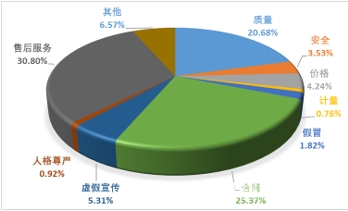
Figure 1 Proportion Chart of Complaint Nature (%)
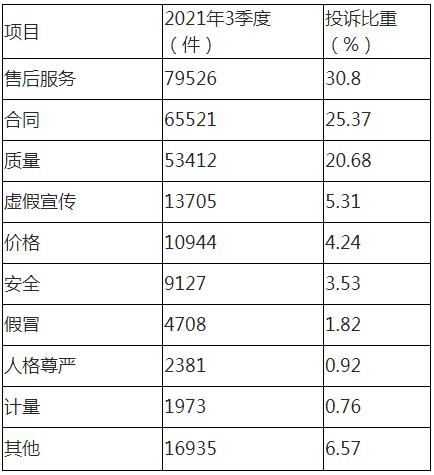
Table 1 Classification of Complaints by Nature
(B) Category analysis of goods and services
Among all the complaints, there were 112,684 complaints about commodities, accounting for 43.64% of the total complaints, 136,665 complaints about services, accounting for 52.92% of the total complaints, and 8,883 complaints about other types, accounting for 3.44% of the total complaints.
According to the complaint data of commodity categories in the third quarter of 2021 (as shown in Figure 2 and Table 2), the complaints of household electronic appliances, daily commodities, food, clothing, shoes and hats and transportation are in the top five.
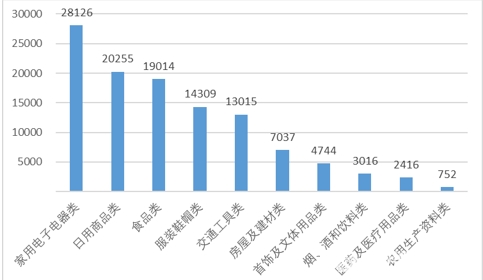
Fig. 2 Complaint volume chart of commodity categories (unit: pieces)
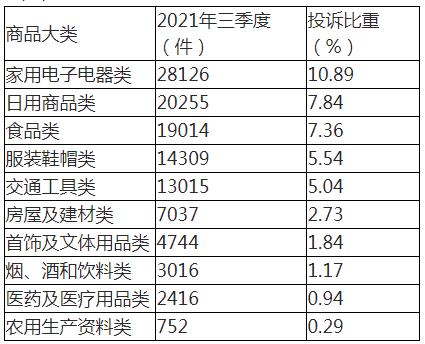
Table 2 Table 2 Changes of Complaints in Commodity Categories
According to the complaint data of service categories in the third quarter of 2021 (as shown in Figure 3 and Table 3), life and social services, Internet services, education and training services, cultural entertainment and sports services and public facilities services rank among the top five in service complaints.
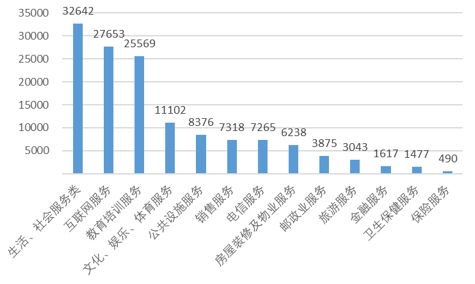
Fig. 3 Complaint Volume of Service Category (unit: pieces)
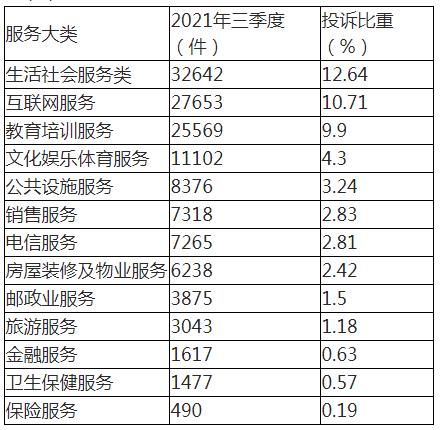
Table 3 Table 3 Changes of Service Complaints
(C) Analysis of changes in complaints about goods and services
Among specific commodity complaints, the top five complaints are (as shown in Figure 4): food, automobiles and parts, clothing, communication products and shoes.
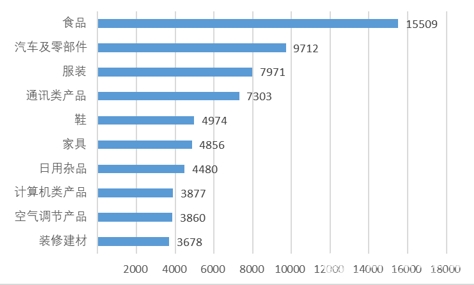
Figure 4 Top Ten Complaints in Commodity Segmentation (Unit: Pieces)
Among the specific service complaints, the top five complaints are (as shown in Figure 5) training service, commercial Internet service, network access service, catering service and fitness service. Due to the broken capital chain of some training institutions, the misappropriation of training fees and the inability to guarantee teachers, related complaints have increased, and many of them are group complaints, which are difficult to solve.
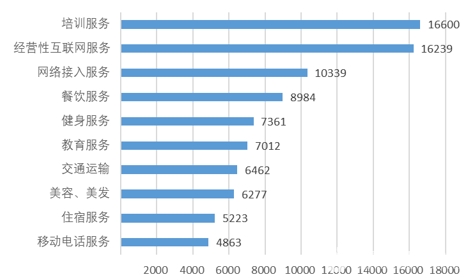
Figure 5 Top Ten Complaints in Service Subdivision (Unit: Pieces)
II. Special Report on Commercial Housing Complaints
Housing demand is one of the most important consumption needs of ordinary people, and it is usually the biggest consumption in a single expenditure. Ordinary consumers are less frequent in commercial housing transactions, lack of relevant knowledge, and real estate transactions are related to many industries such as finance, which complicates the transaction of commercial housing. Consumers often have consumption disputes while realizing their housing needs through buying and selling commercial housing.
(A) the quality of housing, hidden mystery hard to prevent.
In terms of housing quality,The main problems complained by consumers are: first, the poor quality of the house, cracks in the wall and ceiling, sinking of the foundation, water leakage from the roof, and blocked pipeline leakage; Second, there are hidden mysteries in finely decorated rooms, such as false materials, high-end publicity, low-standard configuration, rough technology and poor quality; The third is to cut corners in concealed works and use inferior materials; Fourth, the layout of hydropower pipelines is not standardized, and unqualified and inferior materials are used.The quality of projects in the same residential area is similar, and it is easy to cause group complaints when there are quality problems; Fifth, the house has quality problems and is not maintained in time or the maintenance quality is poor.
For example, in 2020, Ms. Zhang purchased a commercial house in Huangdao District, Qingdao, Shandong Province, and the developer promised to deliver the house in July 2021 at the latest. In June, 2021, the developer notified the delivery of the house. However, during the house inspection, Ms. Zhang found that the steel bar at the top of the kitchen of the house was leaking, the waterproof layer of the bathroom was not laid, and the height of the house did not meet the contract. She asked the developer to make rectification, but the developer always ignored it. After receiving the complaint, Qingdao Consumer Rights Protection Committee contacted the person in charge of the developer for investigation and verification. The person in charge said that the problem reflected by Ms. Zhang was true, and she would actively negotiate with Ms. Zhang in the later stage to properly handle the rectification plan proposed by Ms. Zhang.
For another example, in August 2021, Mr. Jiang complained to the Committee of Shanghai Consumer Rights Protection Committee, and he bought a finely decorated house, which was accepted at the end of October 2020. Shortly after check-in, it was found that the walls of many rooms were moldy and seeping, the wallpaper fell off in a large area, and the ceiling was cracked, which was reported to the developer many times. The other party sent a construction team to repair them at home. Because of the use of inferior and smelly wallpaper, the problem of wall seepage and mildew was never solved, which brought great troubles to consumers’ normal life. Mr. Jiang believes that the developer’s construction quality is poor and requires a thorough solution to the problem. Developers insist that these are normal phenomena, not construction quality problems. Experts from Shanghai Consumer Protection Committee and Jiezhuang Office visited the site. After testing, it was found that the wall fell off to varying degrees and water seepage was caused by improper handling at the grassroots level. The developer should bear the maintenance responsibility and compensate the consumers for the losses caused by the construction quality. On September 8, 2021, after on-site mediation, the two parties reached a settlement, and the developer compensated the consumer for 20,000 yuan in cash at one time, which was repaired by the consumer.
For another example, on September 6, 2020, more than 60 owners of a Hong Kong-branded building in Guangzhou collectively reported to the Guangzhou Consumer Council that there was a serious rust problem in the water pipes of the newly acquired building in the community. Corrosion of water pipes will affect the safety of water use and greatly shorten the normal service life of water pipes, which will pose a hidden danger to the quality of houses. Some owners hired people to replace the indoor water pipes themselves, but found that they failed to dig the main water pipes according to the indoor water supply and drainage layout diagram provided by the developer. Owners have repeatedly negotiated with developers through the property, questioning the quality of the project, demanding to provide household acceptance forms, water pipe material inspection reports and concealed engineering acceptance and other relevant documents, and replacing rusty water pipes. Developers have not responded positively, but only authorized property companies to explain that water pipe rust is a normal physical phenomenon. After the Guangzhou Consumer Council intervened in the mediation, it adopted the methods of enterprise interviews and media exposure to promote it layer by layer, and urged the developers to respond and deal with it. On March 26, 2021, the two sides reached a settlement.
[Opinions of Consumers Association]
Article 10 of the Supreme People’s Court’s Interpretation on Applicable Legal Issues in the Trial of Disputes over Commercial Housing Sales Contracts stipulates: "If the buyer requests to terminate the contract and compensate for the losses due to the serious impact of housing quality problems, it shall be supported. The house delivered for use has quality problems, and within the warranty period, the seller shall bear the responsibility for repair; If the seller refuses to repair or delays the repair within a reasonable period, the buyer may repair it by himself or by entrusting others. The repair costs and other losses caused during the repair period shall be borne by the seller. " Therefore, when the quality of the main structure of the house is unqualified and there are serious quality problems, which affect the living of consumers, consumers can ask for the termination of the contract and claim the developer to compensate for the losses. When there are non-serious quality problems such as water seepage and hollowing in the house, the developer shall undertake the warranty obligation and be liable for compensation for other losses caused during the warranty period.
(two) the price increase, disguised to raise the selling price
In terms of housing prices, the main problems complained by consumers are as follows: First, buying a house is required to buy renovation packages, upgrade packages and other expenses, thus raising housing prices in disguise. Some property consultants who sell real estate with lottery numbers implicitly tell buyers that they can’t sign a house purchase contract without buying a "decoration upgrade package"; The second isFree to collect fees other than the house price, such as group purchase fee, numbering fee, renovation fee, account opening fee, etc.;The third is to confuse the down payment, down payment, intention payment, etc. Some developers collect sincerity money when selling, and turn sincerity money into a deposit and issue a special receipt when choosing a house without the consent of consumers. Refund the refund on the grounds that the deposit is not refundable in case of dispute.
For example, in May 2019, Mr. Jiang bought a house in a real estate in Nanjing, Jiangsu Province. When paying by credit card, Mr. Jiang was required to pay by two brushes, one was 2.76 million yuan and the other was 500,000 yuan. The unit names of the two receipts were different, of which 500,000 yuan was the renovation fee, and the receipt unit was a building decoration engineering company. At that time, the renovation project and standard were not given, and the content of 500,000 yuan renovation was not reflected in the contract. Later, it was learned that other owners of the same apartment with Mr. Jiang did not receive the renovation fee of 500 thousand yuan. On June 30, 2021, Mr. Jiang reported the relevant problems to Nanjing Consumers Association and asked for a refund of 500,000 yuan. After mediation by the staff of Nanjing Consumers Association Real Estate Consumer Rights Protection Committee, the company finally refunded 500,000 yuan to Mr. Jiang.
For another example, on August 17, 2021, the Committee for the Protection of Consumer Rights and Interests of Huidong County, Liangshan Prefecture, Sichuan Province received a group complaint from several owners’ representatives in a certain district about a real estate development company illegally charging 841 owners’ natural gas account opening fees. After investigation, the real estate company recently asked the owners of the community to pay a natural gas account opening fee of 3,500 yuan per household, but the purchase contract stated that the water, electricity and gas links in the community should be delivered. After many unsuccessful negotiations with the company, the owners collectively complained to the Huidong County Consumer Council. County Consumer Council has organized both parties to conduct on-site mediation for many times. The real estate company said that the energy company wanted to charge this fee, but they just collected it, but failed to show any basis for charging the initial installation fee of natural gas. The Guiding Opinions on Standardizing the Installation Fees of Urban Gas Projects jointly issued by the National Development and Reform Commission, the Ministry of Housing and Urban-Rural Development and the General Administration of Market Supervision (NDRC Price [2019] No.1131) clearly stipulates that "the installation fees of gas projects within the red line of the supporting construction planning of new commercial housing shall be uniformly included in the development and construction costs of commercial housing, and real estate development enterprises and gas enterprises shall not separately charge the buyer." The staff of the Consumer Council explained the relevant contents to the real estate company in detail. After mediation, the real estate company made a promise to the owner that it would no longer charge the initial installation fee of natural gas, and it was not allowed to charge the fee in any name.
For another example, on September 6, 2021, the Consumer Protection Committee of Lingbi County, Suzhou City, Anhui Province received a complaint from Ms. Chen, a consumer, saying that she went to a real estate project in Lingbi County to look at the house. The salesperson verbally publicized that the middle school of the community was the school district of No.6 Middle School. After repeated confirmation by the consumer, she decided to buy and pay a subscription fund of 20,000 yuan, and then changed to subscription under the guidance of the salesperson. On July 22, the Education Bureau issued a school district division document, and the junior middle school of the property was another school, which did not meet the original promise. On July 30th, the consumer asked the salesman to check out. The salesman insisted that it was the Sixth Middle School District. The consumer asked that the Sixth Middle School District be included in the contract, but the salesman disagreed. The consumer asked the real estate company to check out and refund the deposit. After receiving the complaint, after mediation by the staff, the operator refunded the consumer a house purchase deposit of 20,000 yuan.
[Opinions of Consumers Association]
Article 13 of the Price Law stipulates that business operators shall clearly mark the price when selling goods and providing services, and shall not sell at a higher price than the marked price, and shall not charge any unspecified fees. Article 4 of the Supreme People’s Court’s Interpretation on Several Issues Concerning the Application of Law in the Trial of Disputes over Commercial Housing Sales Contracts stipulates: "If the seller accepts a deposit from the buyer as a guarantee for concluding a commercial housing sales contract through subscription, ordering, reservation, etc., if the commercial housing sales contract cannot be concluded due to one of the parties, it shall be handled in accordance with the provisions of the law on deposit." Article 587 of the Civil Code stipulates: "If the debtor performs the debt, the deposit shall be used as the price or recovered. If the party paying the deposit fails to perform the debt or the performance of the debt does not conform to the agreement, so that the purpose of the contract cannot be achieved, it has no right to request the return of the deposit; If the party receiving the deposit fails to perform the debt or the performance of the debt does not conform to the agreement, so that the purpose of the contract cannot be achieved, the deposit shall be returned twice. " In the sale of commercial housing, developers often collect consumer fees in advance in various names, such as subscription fund, sincerity fund and queuing fee, and then convert them into deposit through contracts, which limits consumers’ right to terminate contracts and damages consumers’ rights and interests. Consumers should pay attention to the contents of relevant bills and contracts to prevent the name of payment from changing.
(3) Concealing exaggeration and inducing buyers in violation of regulations.
In terms of sales promotion, the main problems of consumer complaints are: first, concealing the nature of the house, inducing consumers to trade in violation of regulations, such as concealing the situation of limited sales (no transfer during the restricted sales period) and the property rights of the apartment (mostly 40 years), which harms consumers’ rights and interests; The second is to make false propaganda and false promises through pictures and words, on-site display, oral promises and other forms; The third is to induce unqualified consumers to buy houses in the name of assisting in handling loans; The fourth is to conceal important unfavorable factors and not fully fulfill the obligation of informing, such as the surrounding facilities; The fifth is to exaggerate the favorable conditions of promoting houses and induce transactions, such asSchool district room,Traffic conditions, etc.
For example, on July 23, 2021, Ms. Consumer Gong came to the Consumer Protection Committee of pinghu city, Jiaxing City, Zhejiang Province to complain that she and her husband came to Pinghu two months ago and ordered a commercial house in a certain building in Danghu Street on June 13. At that time, she paid a earnest money of 200,000 yuan, and only had the subscription book and the receipt. She complained that the developer did not inform that the commercial house was located next to the crematorium when she bought it, and concealed important information, and asked the developer to return the house. The developer delayed and refused to return it. After the staff of pinghu city Consumer Protection Committee received the complaint, after many times of communication, the developer agreed to refund, and the consumer expressed satisfaction.
For another example, on July 5, 2021, consumer Mr. Dong complained to Xiamen Consumer Rights Protection Committee, saying that he signed a commercial housing sales contract with a real estate development enterprise in Xiamen on May 15, 2018, and when he was ready to take over the house in September 2020, he found that it was impossible to clarify the nature and scope of the use of the garden and basement promised by the real estate development enterprise at the time of sale. Consumers have repeatedly asked real estate development enterprises to give relevant explanations and solutions, but after ten months, the other party still has no clear reply and sincerity to solve the problem. Xiamen Consumer Protection Committee immediately launched an investigation after receiving the complaint. The person in charge of the real estate development enterprise said that the nature of the garden before and after the original promise was shared by the owners and could not be given a clear property right. Finally, after many mediations, the real estate development enterprise compensated the consumer Mr. Dong for half a year’s property fee, and the consumer agreed.
Another example is that in early May 2021, Mr. Zhong, a consumer, took a fancy to a 79-square-meter commercial house in a real estate sales department in Weiyuan County, Neijiang City, Sichuan Province, with a total house price of more than 330,000 yuan. Mr. Zhong told the sales staff that he might not be able to apply for a loan because of the credit problem, and the sales staff said that they had channels to help consumers successfully apply for a loan from the bank. Subsequently, the two sides signed an order contract, and the consumer paid 30% of the down payment by mortgage, totaling more than 100,000 yuan. The two sides agreed that the remaining 236,000 yuan would be assisted by the sales department to apply for a loan from the bank. As the loan was not approved, consumers could not afford the remaining house payment. In early June, consumers demanded to cancel the purchase contract and refund the house payment. The developer said that if the house purchase contract is terminated, it should pay 15% of the total house price as stipulated in the contract, totaling more than 50,000 yuan as liquidated damages. Repeated negotiations between the two sides failed, and consumers complained to Weiyuan County Consumer Protection Committee on July 1. After four times of on-site mediation organized by the staff, the developer finally agreed to refund the down payment of the consumer and terminate the contract.
[Opinions of Consumers Association]
Consumers have the right to know the real situation of the purchased house, including the house itself, supporting facilities and surrounding planning. Article 3 of the Supreme People’s Court’s Interpretation on Several Issues Concerning the Application of Laws in the Trial of Disputes over Commercial Housing Sales Contracts stipulates: "The sales advertisements and publicity materials of commercial housing are invitations to offer, but the explanations and promises made by the seller on the housing and related facilities within the scope of commercial housing development planning are specific and have a significant impact on the conclusion of commercial housing sales contracts and the determination of housing prices, which constitute an offer. Even if the explanation and promise are not included in the commercial housing sales contract, they should be the contents of the contract. If the parties violate it, they should bear the liability for breach of contract. " Article 15 of the Measures for the Administration of Commercial Housing Sales stipulates: "The parties concerned shall agree on the matters clearly stated in the advertisements and publicity materials for commercial housing sales issued by real estate development enterprises and real estate intermediary services." In addition, the Regulations on the Publication of Real Estate Advertisements stipulates that the contents of real estate advertisements shall not contain the promise of appreciation or return on investment, shall not indicate the location of the project by the time it takes for the project to reach a specific reference, shall not violate the relevant state regulations on price management, and shall not mislead and publicize the municipal conditions under planning or construction. For housing transactions, consumers should make reasonable arrangements based on their own credit conditions. If they do not meet the credit conditions, do not trust the promise of developers or intermediaries to help successfully handle loans.
(4) Fancy breach of contract, refusing to take responsibility for various reasons.
In terms of contract performance, the main problems of consumer complaints are as follows: First, the delivered house is inconsistent with the model house and loushu publicity. For example, the height of the building becomes lower and there are more beams; Second, the housing area has shrunk, which is inconsistent with the area agreed in the contract; Third, the developer delayed the delivery of the house and refused to bear the liability for breach of contract; Fourth, after the delivery of the house, it is impossible to assist the owner in handling the transfer in time; Fifth, green belts, fitness areas, etc. have not been delivered with the room or changed to other uses, such as changing swimming pools into parking spaces; Sixth, use supplementary agreements and special agreements to promote unfair format clauses.
For example, in November 2019, Mr. Pan, a consumer in Tianchang City, Chuzhou, Anhui Province, ordered a house from a real estate company in Tianchang City. At the same time, he signed an agreement to return the house without reason. The agreement stipulated that the buyer had the right to return the house without reason at any time from the date of signing the Commercial House Sales Contract and the Agreement to the date of handling the check-in formalities. Since Mr. Pan signed the contract in November 2019, the real estate company has been unable to formally sign online, so it applied for no reason to check out on November 9, 2020. However, the real estate company did not give a refund for various reasons. In June 2021, Mr. Pan complained to the Tianchang Consumer Protection Committee. The Municipal Consumer Protection Committee immediately arranged a special investigation after receiving the complaint, and the consumer complaint was true. After communication and mediation by the staff of the Consumer Protection Committee, an agreement was finally reached: the accused real estate company arranged a special person to handle the refund, and the consumer received a check-out payment of more than 640,000 yuan in late July.
Another example is that Ms. Zhang complained to the Xiamen Consumer Rights Protection Committee that she bought a property with an area of 84.08 square meters through a real estate development company in Xiamen on July 2, 2019. When the house was delivered on June 18, 2021, the acceptance materials submitted by the real estate company showed that the actual measured area was 83.28 square meters (the area difference was 0.8 square meters, and the price difference was 31,439.2 yuan), and the real estate company indicated that the price difference would not be refunded if the area difference was less than 1% as agreed in the contract. Paragraph 1 of Article 13, Chapter 5 of the Contract stipulates that the absolute value of the error ratio of the interior construction area is less than 3% (including 3%), and the house price shall be settled according to the facts. The supplementary agreement stipulates that when the absolute value of the error ratio of the construction area is greater than 1% and less than 3%, the house price shall be settled according to the contract unit price. Consumers think that the main contract is clear and there is no need to sign a supplementary agreement. The relevant content of the supplementary agreement is a complete deviation from the main contract. There is a dispute between buyers and sellers. After investigation, Xiamen Consumer Protection Committee organized both parties to conduct on-site mediation, and Ms. Zhang proposed a plan to exempt property fees for 1-2 years, but both parties failed to reach an agreement. Later, after telephone contact, the real estate company agreed to give a broken wall machine as compensation.
For another example, on September 9, 2021, Mr. Wu complained to the Consumers Association of Zhenjiang City, Jiangsu Province that when signing the formal house purchase contract, Mr. Wu found that there were unequal clauses in the contract, and his liability for breach of contract was not equal to that of the developer. If Mr. Wu breached the contract, he would have to pay the developer three ten thousandths of the penalty for overdue payment, while the developer would only have to pay the consumer one thousandth of the penalty for overdue delivery. Mr. Wu objected to this clause. The developer said that the contract was a model contract provided by the Housing and Urban-Rural Development Bureau. If you have any questions, you should consult the Housing and Urban-Rural Development Bureau. The consumer consulted the Housing and Urban-Rural Development Bureau and replied that the model contract was provided by the Housing and Urban-Rural Development Bureau, but the specific content was negotiated between the developer and the consumer. If there were obviously unequal terms in the contract, it was definitely not acceptable. However, the developer insisted on changing the terms of the contract and asked Mr. Wu to continue to perform the contract. After mediation by the staff of Zhenjiang Consumers Association, the person in charge of the developer agreed to refund Mr. Wu’s deposit, and stated that all the legal responsibilities in the four real estate contracts for sale in Zhenjiang would be changed to reciprocal responsibilities. Mr. Wu expressed satisfaction with the result.
[Opinions of Consumers Association]
It is the duty of the operator to perform the contract according to law and deliver it qualified. According to the provisions of the Civil Code, business operators should fully perform their obligations in accordance with the agreement. If the performance does not meet the agreement, they should bear the liability for breach of contract in accordance with the contract. Article 30 of the Measures for the Administration of Commercial Housing Sales stipulates: "The real estate development enterprise shall deliver the commercial housing that meets the delivery conditions to the buyer on schedule in accordance with the contract. If it fails to deliver on time, the real estate development enterprise shall bear the liability for breach of contract. " Compared with consumers, developers belong to a strong side. Some developers use deposits to fix consumers first, and then "bypass" model contracts such as supplementary agreements to force consumers to accept unfair format clauses drawn up by them unilaterally, exclude and restrict consumers’ rights, increase consumers’ responsibilities, and reduce or exempt operators’ responsibilities. Consumers either accept unfair clauses or lose deposits, which is in a dilemma.This should be severely punished.
(5) Housing agencies, be careful when they are mixed.
In terms of housing agencies, the main problems of consumer complaints are: First, some housing agencies resort to deceit, such as publishing false housing information, opaque housing prices, concealing the real situation of housing, etc. Second, there are some phenomena of arbitrary charges, such as collecting agency fees and bank loan fees without telling or without the consent of consumers; Third, some housing agencies violate the rules, such as revealing personal information of buyers and sellers, promising to apply for bank loans, supervising funds for buyers instead of banks, and taking the purchase money for themselves or using it for other purposes; Fourth, some intermediary companies and staff confuse the concepts of online signing for filing, online signing for intermediary, mortgage, etc., misleading buyers, so that they can not realize online signing transfer after paying down payment and intermediary fees; Fifth, some use standard clauses to infringe upon the legitimate rights and interests of consumers or fail to perform in accordance with the contents of the contract.
For example, in May 2021, Mr. Jiang from Taizhou City, Zhejiang Province purchased a second-hand house through Huangyan Kaihong Real Estate Agency. Later, when Mr. Jiang went through the transfer formalities, he had to pay 5.6% value-added tax and additional taxes in full because the property was less than two years old. Mr. Jiang thinks that the intermediary clearly introduced the property right of the property for more than two years, but now it is less than two years, which is inconsistent with the reality, so he complained to Taizhou huangyan district Consumer Rights Protection Committee. After receiving the complaint, the staff contacted both parties to mediate. Because the gap between the two parties’ demands for fee reduction was too large, the mediation was unsuccessful. Mr. Jiang said that it would be resolved through legal channels.
Another example is that in July 2021, Ms. Wang bought a house through a real estate agent in Jiyuan City, Henan Province. On the day of signing the contract, Party A claimed that the real estate license was lost, and repeatedly guaranteed that the real estate area was 116 square meters. The consumer paid 50,000 yuan in advance to the real estate agent. Later, when consumers went to the bank to handle the loan procedures, they learned that the actual registered area of the property was 113.22 square meters, which was 2.78 square meters less than that in the contract. The consumer immediately reported the problem of area discrepancy with the real estate agent. After the intermediary learned it, it proposed to negotiate with Party A to reduce the original transaction price by 30,000 yuan, but Party A did not agree. The consumer asked for a refund of 50,000 yuan, and the person in charge of the real estate agent said that he could only refund 30,000 yuan. On September 3, consumers complained to Jiyuan Consumer Rights Protection Committee. After mediation, the three parties finally reduced the transaction price of the original contract by 20,000 yuan and reached a settlement agreement.
[Opinions of Consumers Association]
Article 22 of the Measures for the Administration of Real Estate Brokers stipulates: "When a real estate brokerage institution signs a house sale or lease brokerage service contract with a client, it shall check the house entrusted for sale or lease, the certificate of ownership of the house, the identity certificate of the client and other relevant materials, and shall prepare a housing condition statement. After the written consent of the client, the corresponding listing information can be released to the public. " Before signing the real estate brokerage service contract, the real estate brokerage agency and broker shall truthfully explain the relevant contents of the real estate brokerage service contract and the house sales contract to the client, and truthfully inform the rights and obligations of all parties.Real estate brokerage institutions and brokers who fail to fulfill their due obligations and cause losses to consumers shall be liable for compensation.
III. Opinions of China Consumers Association on the commercial housing industry
(a) adhere to the "housing", safeguard the healthy development of the real estate market and the legitimate rights and interests of housing consumers.With the continuous implementation of real estate control policies, the real estate industry has gradually entered an adjustment period. However, some real estate operators have not got rid of the seller’s market thinking, and are still using their strong position to "squeeze" consumers through various means to make profits. In the face of policy adjustment and market changes, relevant operators should change their business philosophy, strive for development by quality, seek benefits from service, base on long-term development, abandon short-sighted behavior, strictly implement relevant laws, regulations and policy documents such as the Civil Code, the Law on the Protection of Consumers’ Rights and Interests, the Urban Real Estate Management Law, the Measures for the Administration of Commercial Housing Sales, and the Interpretation of the Supreme People’s Court on Several Issues Concerning the Application of Laws in the Trial of Disputes over Commercial Housing Sales Contracts, so as to earnestly undertake due obligations and responsibilities and protect the legitimate rights and interests of buyers.
(two) real estate enterprises should operate in good faith according to law, quality and quantity of qualified delivery.Real estate enterprises should ensure the quality of houses in strict accordance with building quality standards, deliver qualified houses and documents such as Residential Quality Guarantee and Residential Instruction Manual to consumers, and put an end to shoddy construction, Jerry-building, false propaganda, improper induction, unauthorized changes, arbitrary breach of contract, bundled price increases, arbitrary charges, overlord clauses, prevarication and other issues, and give back to the trust of consumers with good quality and sincere service. The project supervision unit shall give full play to its role, supervise the construction quality and strictly control it in accordance with laws, regulations and relevant technical standards, design documents and construction project contracts.
(three) the housing intermediary institutions should strengthen management, effectively restrain employees, and earnestly fulfill their due obligations.We should strictly abide by the Measures for the Administration of Real Estate Brokers and other regulations, abide by professional norms and ethics, mark the service items, service contents, charging standards and related real estate prices and information in a prominent position in the business premises, carefully check the houses and house ownership certificates entrusted for sale or lease, the identity certificates of the clients and other relevant materials, and explain to consumers in detail the relevant contents of real estate brokerage service contracts, house sales contracts or house lease contracts, especially the real situation of houses and important contents related to consumers’ interests. Housing agencies should eliminate the information gap, provide convenience for all parties to the transaction, effectively enhance the service value, and put an end to publishing false information, concealing the real situation, using unfair format terms and other violations of consumers’ legitimate rights and interests.
(4) Consumers should pay attention to seeing more and asking more questions when buying a house, and strengthen self-protection.It is necessary to carefully check the qualifications and credibility of real estate development enterprises and housing intermediaries. When buying a new house, pay attention to the State-owned Land Use Right Certificate, Construction Land Planning Permit, Construction Project Planning Permit, Construction Project Construction Permit, Commercial Housing Pre-sale Permit or Commercial Housing Sales Permit. For the location, environment and supporting facilities of the house, don’t trust verbal promises, and important contents must be written into the contract. Pay attention to the understanding of housing property rights, purchase restriction policies, loan conditions and other related content. If you don’t meet the conditions for buying a house, don’t take chances and hope that the operators will make false promises. Before signing the contract, you should carefully read and fully understand the terms of the contract, supplementary agreements and contract annexes, such as housing area, floor, housing number, housing price, delivery time, delivery standards, conditions for terminating the contract, and liabilities for breach of contract. We should pay attention to the preservation of the publicity materials, purchase contracts, payment bills, model housing materials and other evidence of real estate and intermediary, so as to safeguard their legitimate rights and interests. When accepting the house, the quality of the house project and supporting facilities should be checked and accepted one by one according to the standards agreed in the purchase contract, and records should be made. If conditions permit, relevant supervision institutions and professional house inspectors can be hired to check and accept together, and pay attention to checking and keeping the Residential Quality Guarantee and the Residential Instruction Manual. In case of disputes, safeguard rights in time according to law.
Statistics of Complaints Accepted in the Third Quarter of 2021
Completed by: China Consumers Association Unit: pieces
